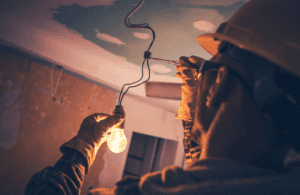
04 Apr Why Do My Lights Flicker When I Use Appliances?
Introduction
Have you ever noticed your lights flickering when you turn on an appliance? It can be an annoying and puzzling experience that leaves you wondering whether it’s a minor inconvenience or a sign of something more serious. While occasional flickering can be normal, frequent or persistent flickering may point to underlying electrical problems that require attention. Understanding why your lights flicker when using appliances can help you pinpoint the cause and determine if you need professional assistance. In this blog post, we’ll explore the common causes of flickering lights, potential safety concerns, and when it’s time to call an electrician in Tulsa.
Common Causes of Flickering Lights
- Overloaded Circuits
One of the most common reasons for flickering lights when using appliances is an overloaded circuit. High-powered appliances, such as air conditioners, refrigerators, or space heaters, draw a significant amount of electricity when they start up. This sudden demand can temporarily pull voltage away from other parts of the circuit, leading to a brief dimming or flickering of your lights.
Imagine you have a circuit that powers both your lights and a heavy-duty appliance like a microwave. When you turn on the microwave, it requires a large surge of electricity, and this momentary surge can cause a drop in voltage to your lights, making them flicker. This is especially true if the circuit is already near its maximum load capacity. Over time, if this issue continues, it can put strain on the wiring, leading to potential safety concerns like overheating or even fires.
To prevent overloaded circuits, it’s important to balance your electrical load. If you frequently experience flickering when using certain appliances, consider redistributing the load by plugging high-powered devices into separate circuits.

- Loose Wiring
Loose or faulty wiring is another common cause of flickering lights. Over time, electrical connections can become loose or corroded due to normal wear and tear, environmental factors, or poor installation. When there’s a loose connection, it creates electrical resistance, which can cause a fluctuation in voltage and result in flickering lights.
If a loose connection is located at the fixture, switch, or even in the electrical panel, it can affect the stability of the electrical current that powers your lights. Loose connections are dangerous because they can cause arcing, which increases the risk of electrical fires. If you suspect loose wiring is the cause of your flickering lights, it’s important to address the issue promptly to avoid further damage.
- Faulty Light Fixtures
Sometimes, the issue lies not with your electrical wiring but with the light fixture itself. If you notice that only one or two lights flicker when you use appliances, the problem may be related to the bulb or the fixture. A loose bulb, damaged socket, or faulty wiring within the light fixture can cause intermittent flickering.
In many cases, replacing the bulb or tightening the socket may resolve the problem. However, if the issue persists even after you’ve replaced the bulb, the fixture itself may be faulty, and you may need to have it inspected or replaced by an electrician.
- Voltage Fluctuations
Voltage fluctuations in your home’s electrical system or in the power grid can also lead to flickering lights. These fluctuations occur when there’s an inconsistent supply of voltage from the electrical grid, or if there are issues within your own electrical panel. Voltage fluctuations are more common during peak usage times, when many households and businesses are using electricity simultaneously.
Sometimes, your electrical panel may not be able to provide a steady flow of power due to issues with the main breaker or faulty circuit breakers. These fluctuations can cause lights to flicker, dim, or even go out momentarily.
In some cases, the flickering may be a result of a larger issue with the utility company’s electrical grid. If you notice that your lights flicker along with other homes or businesses in your neighborhood, it’s possible that the issue is on the utility company’s side. If it’s limited to your home, however, the problem may lie within your own electrical system, and it’s best to have a professional assess your electrical panel.
When to Call an Electrician
While occasional flickering is typically not cause for concern, there are certain scenarios where you should definitely call a professional electrician. Ignoring these signs can lead to more serious electrical hazards that could put your safety at risk.
- If Flickering Happens Consistently

Occasional flickering may occur when large appliances like refrigerators or air conditioners start up, but if you notice your lights flickering regularly or consistently—especially when you’re using multiple appliances at once—it could be a sign of a deeper electrical issue. Consistent flickering may indicate that your electrical system is overloaded or that there’s a problem with your wiring, circuit breakers, or electrical panel.
- If It Occurs Across Multiple Rooms
If the flickering is localized to a single light fixture or room, it may be a sign of an issue with that particular fixture or circuit. However, if you notice flickering lights throughout your home, it could indicate a problem with your electrical panel or the main power supply. Flickering across multiple rooms may suggest that the problem is more widespread and could require professional intervention.
- If You Notice Burning Smells or Buzzing Sounds
A burning smell or buzzing sound coming from your electrical outlets, light fixtures, or electrical panel is a major red flag. These signs may indicate overheating wires, loose connections, or a failing electrical component. If you notice any of these warning signs in conjunction with flickering lights, it’s crucial to call an electrician immediately. These are serious safety hazards that can lead to electrical fires if left unaddressed.
- If You Don’t Feel Comfortable Troubleshooting
If you’re unsure about the cause of your flickering lights or don’t feel comfortable investigating the issue yourself, don’t hesitate to call an electrician. Electrical work can be dangerous, and it’s always best to leave it to the professionals. An experienced electrician will be able to diagnose the issue, ensure that everything is up to code, and make any necessary repairs to restore the safety and functionality of your electrical system.
Conclusion
Flickering lights can be frustrating, but understanding the underlying causes can help you take the right steps to address the issue. From overloaded circuits to loose wiring, faulty light fixtures, and voltage fluctuations, there are several reasons why your lights may flicker when you use appliances. While occasional flickering is usually nothing to worry about, it’s important to recognize when the problem might be more serious. If you experience consistent flickering, notice signs of burning or buzzing, or if the problem persists across multiple rooms, it’s time to call a professional electrician in Tulsa.
By addressing electrical issues promptly, you can ensure the safety and reliability of your home’s electrical system while avoiding costly repairs down the road. Remember, when it comes to electrical work, safety always comes first.